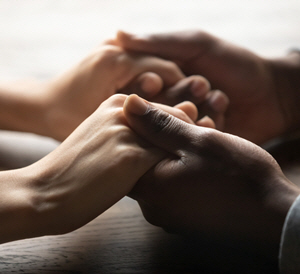 “He was my best friend, my everything. I just wish I could get past the heartbreak and pain to enjoy the happy memories.”
“He was my best friend, my everything. I just wish I could get past the heartbreak and pain to enjoy the happy memories.”
“My heart aches for her every day. I still reach for her at night, but the bed is empty. I don’t know if life will ever have meaning for me again. I want her back!”
“I think of them all the time. Everything in their room reminds me of them. Sometimes I just sit there and cry for a long time. I miss them so terribly.”
The tragedy of loss. It’s heartbreaking.
The grief and anguish in these expressions are palpable. They could be the words of people who lost a spouse, child, or parent to death. Yet, while death often causes the most intense type of grief, any type of loss can lead a person to grieve, such as the loss of a friendship or a mate through divorce.
No matter the cause, the loss of a beloved person can be devastating and traumatic. It causes all sorts of physical, mental, and emotional hurt. The deepest and lasting pain usually stems from a broken heart.
It has been described by some as the stab of a knife that is slowly and steadily twisted. It’s emotionally crippling.
If you’re suffering this kind of pain, don’t despair. The hurt may seem unending, but there is hope. You can cope with your heartbreak and eventually heal the wound.
Seek Help to Heal From the Heartbreak of Loss
Finding help and support is key to healing a broken heart. Even if you’re not very comfortable talking about your feelings, it’s important to find someone who can provide an outlet.
What possibilities should you consider?
Family and Friends
An obvious first-line of support can come from family members and friends. You can gain great comfort in leaning on those that care about you the most. Draw close to them, talk together and cry together. Reminisce and recall positive memories. There’s a special connection that forms when you share in each other’s memories of the person you’ve lost. What’s more, it can ease the pain of the heartache a lot.
Support Groups
If you have no family or friends to lean on, or you feel they just don’t understand the situation, you may want to seek out the help of a support group. Sharing your grief, heartbreak, and loneliness with those who have experienced similar loss can be a great comfort and help.
What if you have trouble expressing your feelings of sorrow in person to others? There are online support groups for those that find it easier to write about their troubles.
 Grief Counseling
Grief Counseling
If your loss and heartbreak are extremely distressing and unrelenting, you should seek out the help of a mental health professional. Furthermore, if not addressed properly, this type of prolonged grief can lead to health problems or depression.
Just like other methods of support, grief counseling encourages you to talk about your loved one – their qualities, their imperfections, their likes and dislikes, their strengths and weaknesses. Furthermore, it helps you keep a healthy connection to the person you’ve lost through memory and reflection.
However, it should be noted that grief counseling is more than self-help methods. It equips you with the techniques to cope with the symptoms of stress connected to your loss. Also, a counselor’s expertise helps you learn to properly express these emotions. It guides you through any obstacles to your healing process.
Although the scars from your loss never completely go away, the acute and excruciating pain of a broken heart can heal when you seek help. Remember, though, be patient and give your heart ample time to mend!
Please contact me if you are looking for extra support through your grieving and heart break. You can heal and experience joy again!


